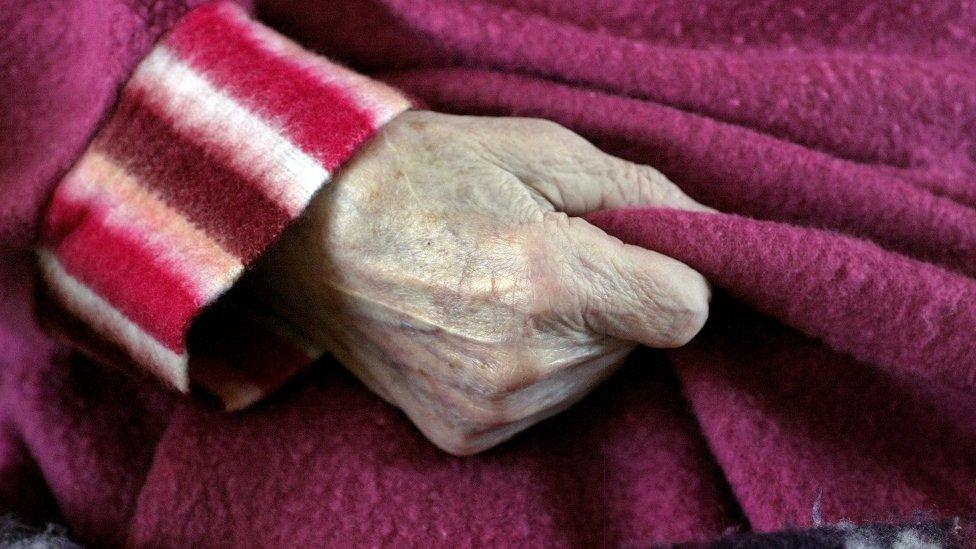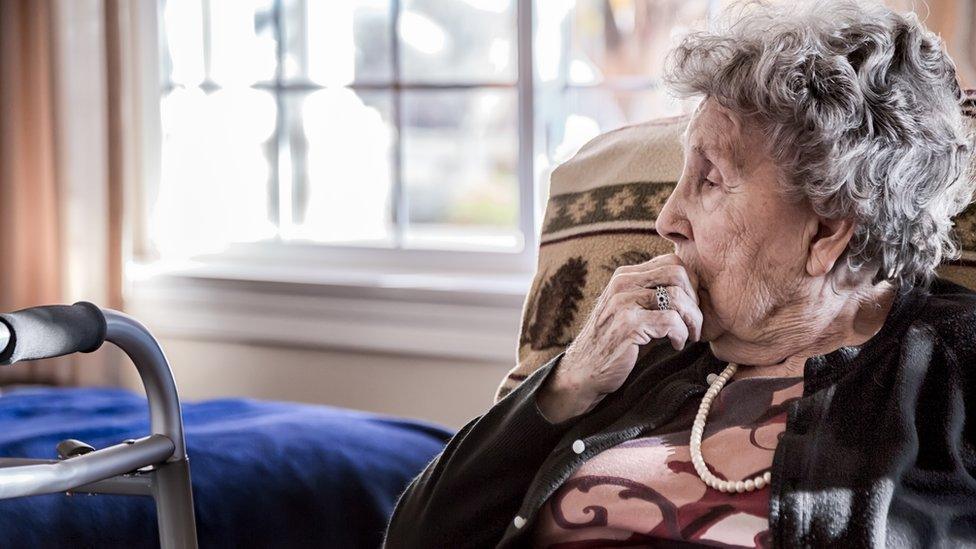Care home resident eviction 'traumatic' - son
- Published

Sam said his mother was in a nightdress, housecoat and slippers when she was told she had no home to go to
The eviction of an elderly woman with dementia from her Northern Ireland care home was "traumatic", her son has said.
The man, who the BBC has called Sam, said his mother was told she was no longer a resident after she returned to the home from hospital.
On Thursday, the commissioner for older people said some care home residents had faced unfair evictions.
Eddie Lynch called for better protection for residents.
He also said some had lost their places because their family was seen as "difficult or undesirable".
A spokeswoman for private care home providers said things "should not get to the level where people feel that they are being evicted".
Evicted in a nightdress and slippers
Speaking to the BBC's Good Morning Ulster programme, Sam said his mother, who died last year aged in her 80s, had developed an infection and was taken to hospital for treatment.
She was released in the early hours of the morning after being declared "fit" but she had no place to go.
"My sister took the precaution to call ahead to the care home because of the early hour and they said my mother was no longer a resident at the care home - the decision was taken and that was that," he said.
"We found out she was being evicted at 01:30 in the morning as she stood in her nightdress, her housecoat and her slippers.
"No right to redress and that was the end of it," he added.
Sam said he felt like the care home had taken an "easy option" by evicting his mother.
"The shock was unbelievable - it's a very easy option to say we can't meet your medical needs, unlucky, bye."

Eddie Lynch said "on occasion" older people were being transferred out of care homes in ways that felt like evictions
Sam contacted the Commissioner for Older People for Northern Ireland's (COPNI) office for help and he later received an apology from the care home.
However, he added: "It wasn't an apology for evicting my mother - it was an apology for not following their procedures."
His mother was placed in a different care home where she was "treated with dignity, respect and compassion", he continued.
A spokeswoman for COPNI encouraged residents and their families to discuss care needs and complaints with their care home providers.
In his report, the commissioner said the contract governing the relationship between care homes and health and social care trusts should be changed.
'Feels like eviction'
Titled Respecting Residents' Rights in Care Homes, it found there was a gap in the system which failed to protect care home residents from being involuntarily transferred or "evicted" to another care home, for reasons other than a change of care needs.
Mr Lynch said: "A series of complaints from older people, their families and friends led me to track occurrences where the contract's conditions for terminating a residency in a care home were misused.
"On occasion, it is being used as a means of evicting residents who are complaining about the level of service they receive, or whose family is seen as difficult or undesirable.
"Most older people live happily in their care homes and many transfers between care homes are due to a legitimate reason such as a change in the residents' healthcare needs.

Eddie Lynch said being moved from a care home can be distressing for residents
"These transfers are planned and agreed with the resident and their family.
"But this report highlights examples where the current contract isn't offering the adequate protections it should for care home residents.
"These examples are of non-voluntary transfers for reasons other than a change of healthcare needs and at unreasonably short timescales.
"These feel like evictions to the residents involved."
The report calls for:
A culture of human rights in care homes
Making explicit the residential protections available to residents of care homes
Clarity on reasons for compulsory transfer to avoid abuse of the system
An independent appeals process with advocacy support for residents
Mr Lynch continued: "Being moved from a care home can be extremely distressing for residents - the resident is suddenly removed from their home with its familiar environment, routine, staff, and community, often at a time when that person has reduced physical or mental capacity.
"Thankfully the majority of older people are secure in their care homes, receiving quality care, but the current system is open to misuse and the Department of Health needs to improve the contract to ensure all residents are treated with dignity and respect in the place they consider their home.
Pauline Shepherd, from the Independent Care and Health Providers umbrella body, said this was "not a common issue" but said there should be "clarity around the complaints process" and agreed with the calls for a review of the care home contract.
"We would not normally issue notices for people to leave - that would only be used as a final straw where there was no agreement or there could be no solution," she said.
"A care home is someone's home," she continued, "but where your home is no longer able to provide you with the level of care [you need] then that is no longer safe".